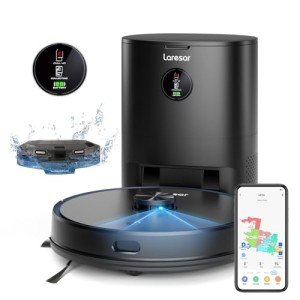Robotic Vacuum Cleaner Comparison: The Future of Home Cleaning
In recent years, robotic vacuum have actually changed the way we keep cleanliness in our homes. With improvements in innovation and the incorporation of artificial intelligence, these devices have evolved from mere novelty products to vital home appliances. This article supplies a thorough comparison of some of the leading robotic vacuum cleaners on the marketplace, helping consumers make informed decisions when picking a model that suits their needs.
Understanding Robotic Vacuum Cleaners
Robotic vacuum are autonomous machines developed to clean floors instantly. Equipped with Auto Vacuum Cleaner , they navigate around barriers and adjust their cleaning paths for maximum efficiency. The key features that separate various models include suction power, battery life, app connection, navigation innovation, and price.
Secret Features to Consider
When comparing robotic vacuum cleaners, prospective buyers need to take into consideration the following factors:
- Suction Power: Measured in Pascals (Pa), suction power figures out the efficiency of choosing up dirt and particles.
- Battery Life: The length of time a vacuum can run before needing a recharge considerably impacts its cleaning performance.
- Navigation Technology: Models may use basic random navigation or sophisticated mapping innovations (like LIDAR) that allow them to develop a map of the home.
- Smart Features: Connectivity to mobile phone apps or smart home systems can enhance use and control.
- Filter Type: HEPA filters are recommended for allergy sufferers, as they trap irritants and improve air quality.
Comparison of Top Robotic Vacuum Cleaners
Below is a comparison table of a few of the very best robotic vacuum readily available in 2023:
| Model | Suction Power (Pa) | Battery Life (min) | Navigation Technology | Smart Features | Price (GBP) |
|---|---|---|---|---|---|
| iRobot Roomba i7+ | 1700 | 75 | Smart mapping | App control, voice command | ₤ 949 |
| Roborock S7 | 2500 | 180 | LIDAR | App control, multi-floor | ₤ 649 |
| Neato D7 | 2000 | 120 | LIDAR | App control, zone cleaning | ₤ 599 |
| Ecovacs Deebot T10 | 3000 | 150 | Smart mapping | App control, room detection | ₤ 799 |
| Shark IQ Robot | 1200 | 90 | Random | App control, self-emptying | ₤ 399 |
Explanation of the Table
- iRobot Roomba i7+: Known for its robust cleaning ability, it features smart mapping technology that permits it to designate specific areas for cleaning. Its self-emptying feature is a plus for benefit.
- Roborock S7: This design masters suction power and battery life, making it perfect for larger homes. Its LIDAR technology assists create an efficient cleaning course, and it can vacuum and mop concurrently.
- Neato D7: The D-shape design permits for better corner cleaning, and it includes strong suction power. Its LIDAR navigation allows it to draw up cleaning locations precisely.
- Ecovacs Deebot T10: Boasting the highest suction power and advanced navigation, this model can deal with several floorings efficiently. It's a versatile choice for families with varying floor types.
- Shark IQ Robot: An affordable choice that still provides smart features. Its self-emptying capability and app combination make it a useful option for those trying to find a strong cleaning companion without breaking the bank.
Advantages of Robotic Vacuum Cleaners
Robotic vacuum use many benefits that contribute to their rising popularity amongst consumers:
- Time-Saving: Automated cleaning permits users to free up important time that can be spent on other activities.
- Convenience: Many models can be scheduled through apps to clean at particular times, minimizing manual effort.
- Accessibility: They can reach under furniture and in tight spaces where standard vacuums may struggle.
- Daily Maintenance: Regular usage of robotic vacuums can assist preserve a regularly tidy environment, promoting much better total home health.
Frequently Asked Questions About Robotic Vacuum Cleaners
1. How typically should I run my robotic vacuum?
It is suggested to run the robotic vacuum a minimum of 2-3 times a week to preserve cleanliness, though everyday use can be useful, especially in homes with pets or high foot traffic.
2. Do robotic vacuums deal with carpets?
Yes, lots of robotic vacuums are developed to work on carpets, however efficiency may differ based upon the model's suction power and brush type. Look for models particularly discussed as efficient for carpets.
3. Can robotic vacuums clean family pet hair?
A lot of robotic vacuums can successfully get pet hair, but those with strong suction and tangle-free brush styles are particularly well-suited for this job.
4. How do I keep my robotic vacuum?
Routine maintenance consists of cleaning the brushes and sensing units, emptying the dustbin, and occasionally changing filters to ensure ideal performance.
5. Are robotic vacuums worth the investment?
While they tend to be more pricey than traditional vacuums, the convenience, efficiency, and time-saving aspects make them a deserving investment for lots of homes.
The marketplace for robotic vacuum continues to broaden as innovation develops, offering customers a variety of options to fit various cleaning requirements and spending plans. By thoroughly considering features such as suction power, battery life, and smart abilities, users can choose a design that lines up with their lifestyle. Whether for convenience, ease of use, or exceptional cleaning efficiency, robotic vacuums are undoubtedly improving the future of home cleaning.

